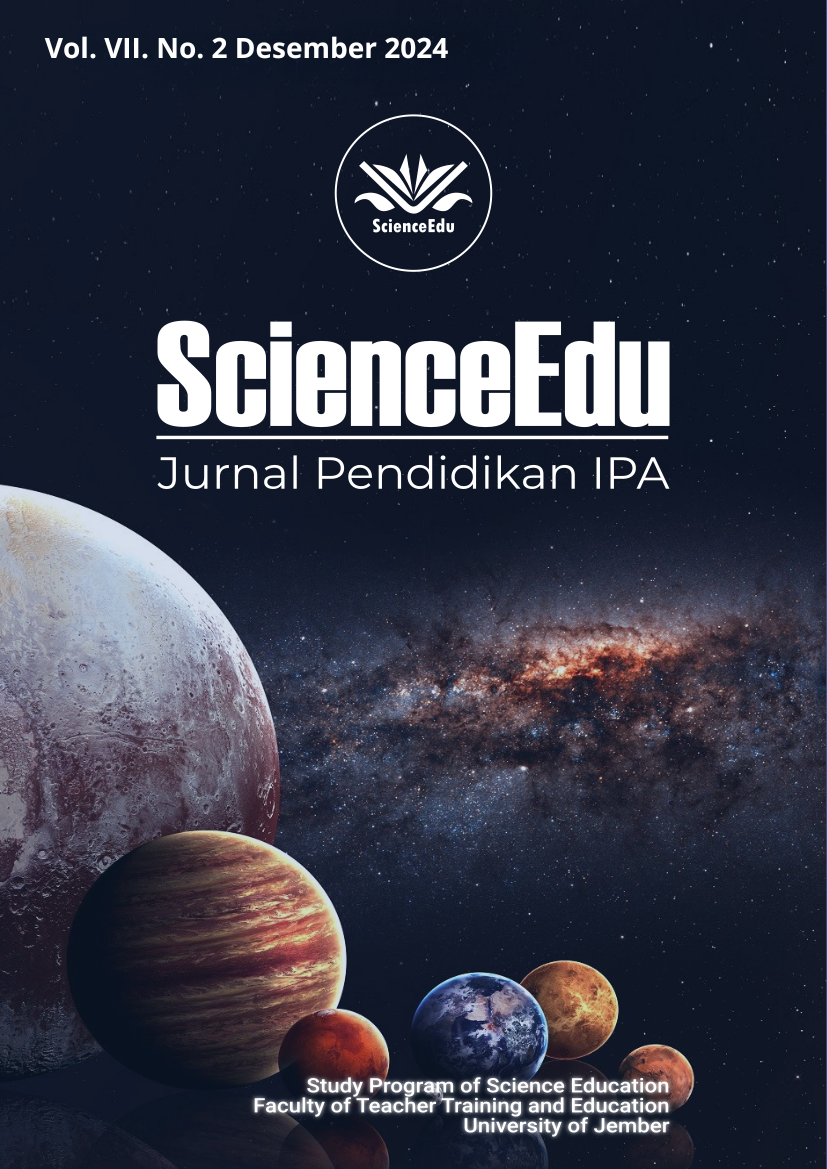PENGEMBANGAN GAME EDUKASI BERBASIS PACE PADA MATERI GERAK PARABOLA UNTUK MENINGKATKAN PENALARAN SISWA
Keywords:
learning media, education game, PACEAbstract
This study produced an educational game based on PACE for the topic of projectile motion. The purpose of this research is to measure the effectiveness of this learning media in enhancing students' reasoning skills. The method used is research and development (R&D) with the ADDIE development model, which includes five sequential stages: analysis, design, development, implementation, and evaluation. Data were collected through a questionnaire in the form of a survey to assess the product’s feasibility, as well as pre-test and post-test questions to evaluate learning outcomes. Data analysis was conducted quantitatively, with the survey responses rated using a ranking scale and categorized, then the overall score percentage was calculated to assess the validity of the media. Pre-test and post-test data were analyzed using t-test and n-gain tests to evaluate the effectiveness on learning outcomes. The research results show that the developed media received scores of 96% from media experts, 93% from subject matter experts, and 93% from practitioners, with an overall average of 94%, placing it in the "very valid" category. For the effectiveness test of the media on learning outcomes, the t-test correlation analysis showed a value of t-calculated > t-table of 6.903 > 1.676, indicating a significant impact of the media on students' learning outcomes. Additionally, the N-Gain score in the experimental class reached 61.4%, which falls into the "quite effective" category. Thus, it can be concluded that the PACE-based educational game for physics learning on projectile motion is effective in enhancing students' reasoning skills.
Downloads
References
REFERENSI
Fitriyani, N. (2019). PENGEMBANGAN MEDIA PEMBELAJARAN AUDIO-VISUAL POWTOON TENTANG KONSEP DIRI DALAM BIMBINGAN KELOMPOK UNTUK PESERTA DIDIK SEKOLAH DASAR. In Jurnal Tunas Bangsa (Vol. 6, Issue 1).
Jumini, S., Madnasri, S., Cahyono, E., & Parmin, P. (2022). Article Review: Integration of Science, Technology, Entrepreneurship in Learning Science through Bibliometric Analysis. Journal of Turkish Science Education, 19(4), 1237–1253. https://doi.org/10.36681/tused.2022.172
Mulyati, S. (2019). Kreativitas Matematis Siswa Pada Pembelajaran Discovery Learning Dengan Media Berbasis Android Studio. PRISMA, Prosiding Seminar Nasional Matematika 2. PRISMA, 2, 788–797. https://journal.unnes.ac.id/sju/index.php/prisma/
Murdani, E. (2020). Hakikat Fisika dan Keterampilan Proses Sains. Jurnal Filsafat Indonesia, 3.
Muttaqiin, A. (2023). Pendekatan STEM (Science, Technology, Engineering, Mathematics) pada Pembelajaran IPA Untuk Melatih Keterampilan Abad 21. JURNAL PENDIDIKAN MIPA, 13(1), 34–45. https://doi.org/10.37630/jpm.v13i1.819
Ricky Yoshua, I. Y. (2022, Mei 30). Pengembangan Video Pembelajaran Animasi Fisika Berbasis Powtoon Pada Materi Pemanasan Global. Jurnal Ilmiah Mahasiswa Pendidikan Fisika, 3(1), 72-29.
Roebianto, A. (2020). The Effects of Student’s Attitudes and Self-Efficacy on Science Achievement. Jurnal Pengukuran Psikologi Dan Pendidikan Indonesia, 9(1), 1–10. https://doi.org/10.15408/jp3i.v9i1.14490
Setiani, A., Hendri, M., & Rasmi, D. P. (2021). Persepsi Peserta Didik terhadap LKPD Terintegrasi STEM pada Materi Suhu dan Kalor. Jurnal Penelitian Dan Pengembangan Pendidikan, 5(2), 287–293.
Sugiyono. (2015). Metode Penelitian Pendidikan. Bandung: Alfabeta.
Sugiyono. (2017). Metode Penelitian Kuantitatif Kualitatif dan R&D. Bandung: Penerbit Alfabeta.
Syawaludin, A., Gunarhadi, & Rintayati, P. (2019). Development of augmented reality-based interactive multimedia to improve critical thinking skills in science learning. International Journal of Instruction, 12(4), 331–344. https://doi.org/10.29333/iji.2019.12421a
Wafiq, K., Rosyid, H., Kristari, A., & Sukmana, F. (n.d.). PENGEMBANGAN MEDIA PEMBELAJARAN GAME EDUKASI BERBASIS ANDROID PADA MATA PELAJARAN FISIKA DENGAN MODEL PROTOTYPE.
Wardani, J. K. (2024). VIDEO ANIMASI ELASTISITAS DAN HUKUM HOOKE (VANTASE) BERBASIS PROJECT BASED LEARNING. https://doi.org/10.21009/03.1201.PF17
Zeng, H., Zhou, S. N., Hong, G. R., Li, Q. Y., & Xu, S. Q. (2020). Evaluation of interactive game-based learning in physics domain. Journal of Baltic Science Education, 19(3), 484–498. https://doi.org/10.33225/jbse/20.19.484


